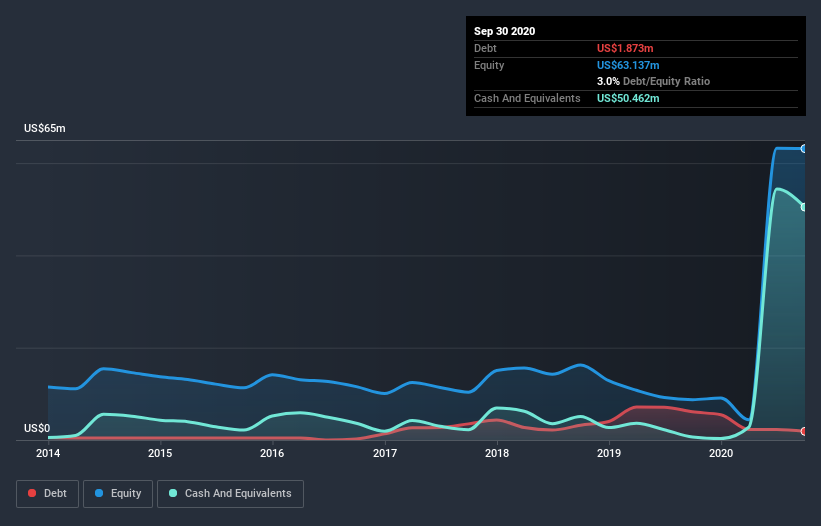Is Genius Brands International (NASDAQ:GNUS) Using Debt In A Risky Way?
The external fund manager backed by Berkshire Hathaway's Charlie Munger, Li Lu, makes no bones about it when he says 'The biggest investment risk is not the volatility of prices, but whether you will suffer a permanent loss of capital.' It's only natural to consider a company's balance sheet when you examine how risky it is, since debt is often involved when a business collapses. We note that Genius Brands International, Inc. (NASDAQ:GNUS) does have debt on its balance sheet. But the real question is whether this debt is making the company risky.
When Is Debt A Problem?
Debt and other liabilities become risky for a business when it cannot easily fulfill those obligations, either with free cash flow or by raising capital at an attractive price. If things get really bad, the lenders can take control of the business. However, a more common (but still painful) scenario is that it has to raise new equity capital at a low price, thus permanently diluting shareholders. Of course, the upside of debt is that it often represents cheap capital, especially when it replaces dilution in a company with the ability to reinvest at high rates of return. The first thing to do when considering how much debt a business uses is to look at its cash and debt together.
Check out our latest analysis for Genius Brands International
What Is Genius Brands International's Debt?
The image below, which you can click on for greater detail, shows that Genius Brands International had debt of US$1.87m at the end of September 2020, a reduction from US$6.10m over a year. However, it does have US$50.5m in cash offsetting this, leading to net cash of US$48.6m.
How Strong Is Genius Brands International's Balance Sheet?
We can see from the most recent balance sheet that Genius Brands International had liabilities of US$6.99m falling due within a year, and liabilities of US$9.07m due beyond that. Offsetting these obligations, it had cash of US$50.5m as well as receivables valued at US$2.40m due within 12 months. So it can boast US$36.8m more liquid assets than total liabilities.
This short term liquidity is a sign that Genius Brands International could probably pay off its debt with ease, as its balance sheet is far from stretched. Succinctly put, Genius Brands International boasts net cash, so it's fair to say it does not have a heavy debt load! When analysing debt levels, the balance sheet is the obvious place to start. But it is Genius Brands International's earnings that will influence how the balance sheet holds up in the future. So if you're keen to discover more about its earnings, it might be worth checking out this graph of its long term earnings trend.
In the last year Genius Brands International had a loss before interest and tax, and actually shrunk its revenue by 65%, to US$1.9m. To be frank that doesn't bode well.
So How Risky Is Genius Brands International?
By their very nature companies that are losing money are more risky than those with a long history of profitability. And in the last year Genius Brands International had an earnings before interest and tax (EBIT) loss, truth be told. Indeed, in that time it burnt through US$7.0m of cash and made a loss of US$395m. With only US$48.6m on the balance sheet, it would appear that its going to need to raise capital again soon. Even though its balance sheet seems sufficiently liquid, debt always makes us a little nervous if a company doesn't produce free cash flow regularly. The balance sheet is clearly the area to focus on when you are analysing debt. However, not all investment risk resides within the balance sheet - far from it. Take risks, for example - Genius Brands International has 4 warning signs (and 2 which are a bit unpleasant) we think you should know about.
If you're interested in investing in businesses that can grow profits without the burden of debt, then check out this free list of growing businesses that have net cash on the balance sheet.
This article by Simply Wall St is general in nature. It does not constitute a recommendation to buy or sell any stock, and does not take account of your objectives, or your financial situation. We aim to bring you long-term focused analysis driven by fundamental data. Note that our analysis may not factor in the latest price-sensitive company announcements or qualitative material. Simply Wall St has no position in any stocks mentioned.
Have feedback on this article? Concerned about the content? Get in touch with us directly. Alternatively, email editorial-team@simplywallst.com.

 Yahoo Finance
Yahoo Finance 
